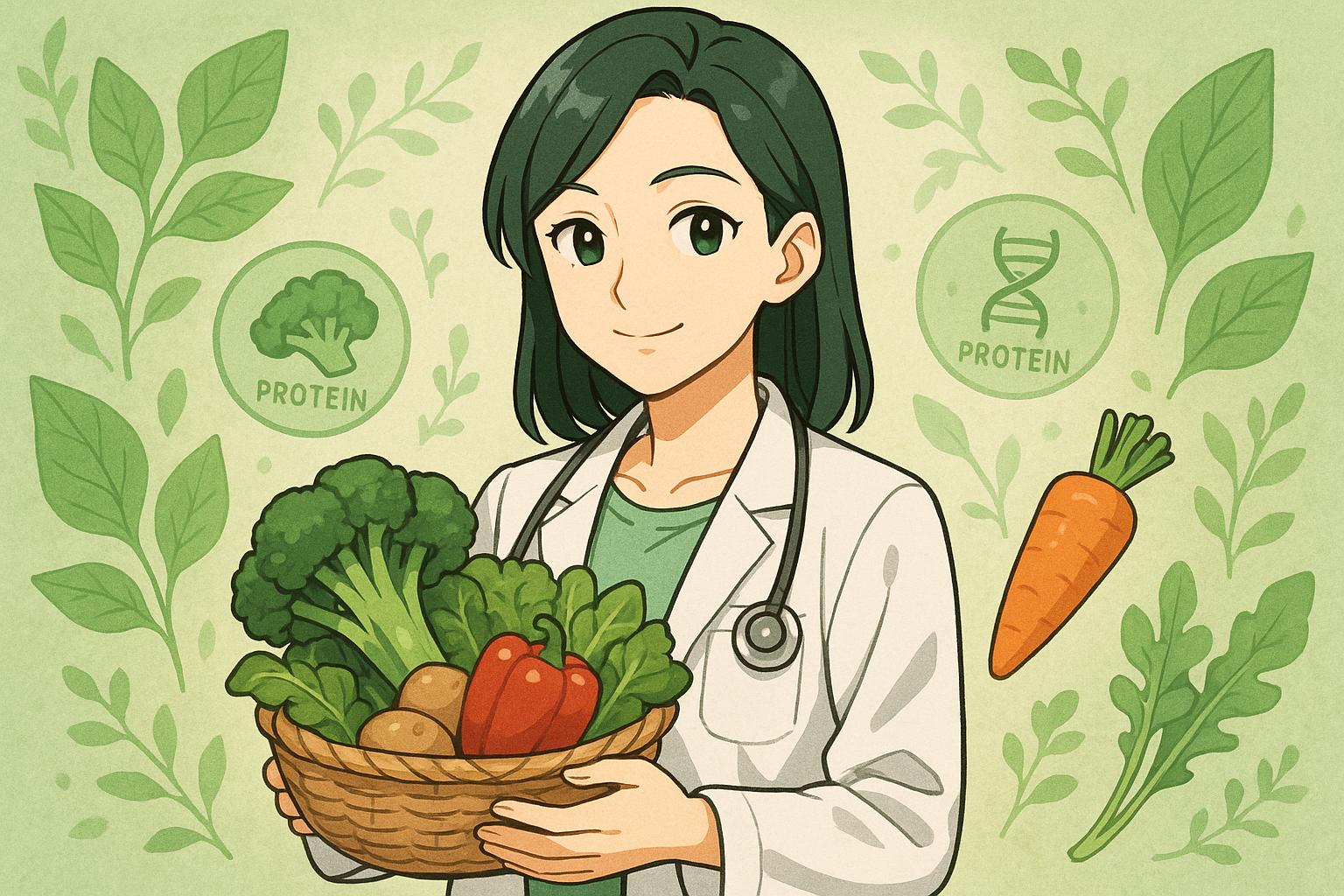Dr Garth Davis addresses common misconceptions about protein needs on vegan diets, emphasising moderate intake and sustainable eating habits to improve adherence and enjoyment of plant-based lifestyles.
Dr Garth Davis, a prominent surgeon and longstanding advocate for plant-based nutrition, recently took to social media to address one of the primary challenges faced by individuals attempting to adhere to a vegan diet: misconceptions surrounding protein intake. In his video, Davis elucidated a prevalent belief that people must consume high levels of protein to maintain health, a notion he argues can lead to dietary fatigue and abandonment of plant-based eating.
Davis asserts that many people overestimate their protein needs, striving for a level of intake that far exceeds what’s necessary for their health. “The number one reason to me that people fail a plant-based diet is because of protein,” he stated. “And not because they’re not getting enough protein. To me, it’s because they’re trying too hard to get these super high doses of protein.” This misunderstanding encourages individuals to consume excessive amounts of protein-rich foods, often resulting in discomfort and digestive issues, which in turn fuels a negative perception of plant-based diets.
He referenced a systematic review and meta-analysis that indicates the optimal protein intake for health and performance is around 1.6 grams per kilogram of body weight. However, the research also highlights that intakes above this threshold yield diminishing returns in terms of muscle mass and strength gains. For the average person, the difference between consuming 1.6 g/kg and 1 g/kg is statistically negligible, asserting that most individuals do not require such high levels of protein to thrive. “The average person does not need 1.6 grams per kilogram,” he emphasised.
While Davis acknowledged that elite athletes or bodybuilders might target higher protein intake levels, he reassured typical consumers that such ambitious goals are unnecessary. “I’m lucky if I [get] 1 gram per kilogram of protein,” he remarked. “And I continue to get stronger and fitter and healthier as I get older.” This insight is particularly valuable for those transitioning to or maintaining a vegan lifestyle, as it encourages a moderate and sustainable approach to nutrition.
Moreover, Davis discussed the unique protein requirements of older adults, suggesting that those over 65 may need slightly increased protein intake—approximately 10 percent more than the average recommendations. This nuanced understanding of protein needs highlights the importance of age and individual circumstances when considering dietary choices.
The discourse surrounding protein intake is part of a larger narrative about the nutritional adequacy of plant-based diets. Despite lingering myths that plant-based eaters struggle to meet their protein needs, numerous health organisations affirm that a well-planned vegan diet can sufficiently fulfil all nutritional requirements. Recent research has demonstrated there is no significant difference in muscle fibre protein synthesis between individuals consuming vegan diets and those following omnivorous regimens.
Dr Davis concluded by advocating for a less rigid focus on protein figures. “In general, you can be extremely healthy on a much lower protein diet, and you will then enjoy your plant-based diet a lot more,” he stated, encouraging individuals to embrace a more relaxed and enjoyable approach to their dietary choices. This perspective not only affirms the viability of veganism but also champions a holistic view of health that prioritises enjoyment and balance over rigid nutritional targets.
As the conversation around plant-based nutrition continues to evolve, Dr Davis’s insights provide a refreshing reminder that a successful diet is not solely defined by its protein content but by the overall nutrient richness and enjoyment it brings to our lives.
Reference Map
- Paragraphs 1, 2, 3, 4, 5, 6, 7.
Source: Noah Wire Services
- https://plantbasednews.org/lifestyle/health/why-some-people-quit-plant-based-diets/ – Please view link – unable to able to access data
- https://www.ncbi.nlm.nih.gov/pmc/articles/PMC5867436/ – This systematic review and meta-analysis examined the effect of protein supplementation on resistance training-induced gains in muscle mass and strength in healthy adults. The study found that dietary protein supplementation significantly increased muscle strength, fat-free mass, and muscle size during prolonged resistance training. However, protein intakes exceeding approximately 1.6 grams per kilogram of body weight per day did not further enhance these gains. The effectiveness of protein supplementation was influenced by factors such as age and training experience, with older adults and those with less training experience showing reduced efficacy.
- https://www.ncbi.nlm.nih.gov/pmc/articles/PMC5867436/ – This systematic review and meta-analysis examined the effect of protein supplementation on resistance training-induced gains in muscle mass and strength in healthy adults. The study found that dietary protein supplementation significantly increased muscle strength, fat-free mass, and muscle size during prolonged resistance training. However, protein intakes exceeding approximately 1.6 grams per kilogram of body weight per day did not further enhance these gains. The effectiveness of protein supplementation was influenced by factors such as age and training experience, with older adults and those with less training experience showing reduced efficacy.
- https://www.ncbi.nlm.nih.gov/pmc/articles/PMC5867436/ – This systematic review and meta-analysis examined the effect of protein supplementation on resistance training-induced gains in muscle mass and strength in healthy adults. The study found that dietary protein supplementation significantly increased muscle strength, fat-free mass, and muscle size during prolonged resistance training. However, protein intakes exceeding approximately 1.6 grams per kilogram of body weight per day did not further enhance these gains. The effectiveness of protein supplementation was influenced by factors such as age and training experience, with older adults and those with less training experience showing reduced efficacy.
- https://www.ncbi.nlm.nih.gov/pmc/articles/PMC5867436/ – This systematic review and meta-analysis examined the effect of protein supplementation on resistance training-induced gains in muscle mass and strength in healthy adults. The study found that dietary protein supplementation significantly increased muscle strength, fat-free mass, and muscle size during prolonged resistance training. However, protein intakes exceeding approximately 1.6 grams per kilogram of body weight per day did not further enhance these gains. The effectiveness of protein supplementation was influenced by factors such as age and training experience, with older adults and those with less training experience showing reduced efficacy.
- https://www.ncbi.nlm.nih.gov/pmc/articles/PMC5867436/ – This systematic review and meta-analysis examined the effect of protein supplementation on resistance training-induced gains in muscle mass and strength in healthy adults. The study found that dietary protein supplementation significantly increased muscle strength, fat-free mass, and muscle size during prolonged resistance training. However, protein intakes exceeding approximately 1.6 grams per kilogram of body weight per day did not further enhance these gains. The effectiveness of protein supplementation was influenced by factors such as age and training experience, with older adults and those with less training experience showing reduced efficacy.
- https://www.ncbi.nlm.nih.gov/pmc/articles/PMC5867436/ – This systematic review and meta-analysis examined the effect of protein supplementation on resistance training-induced gains in muscle mass and strength in healthy adults. The study found that dietary protein supplementation significantly increased muscle strength, fat-free mass, and muscle size during prolonged resistance training. However, protein intakes exceeding approximately 1.6 grams per kilogram of body weight per day did not further enhance these gains. The effectiveness of protein supplementation was influenced by factors such as age and training experience, with older adults and those with less training experience showing reduced efficacy.
Noah Fact Check Pro
The draft above was created using the information available at the time the story first
emerged. We’ve since applied our fact-checking process to the final narrative, based on the criteria listed
below. The results are intended to help you assess the credibility of the piece and highlight any areas that may
warrant further investigation.
Freshness check
Score:
8
Notes:
The narrative does not appear to reference outdated information or events. However, specific dates or recent developments are not mentioned, which might suggest it is not extremely fresh.
Quotes check
Score:
8
Notes:
Direct quotes from Dr. Garth Davis are provided, but no online sources confirm these quotes as original or first-time statements. Without further verification, it is difficult to determine if they are newly stated or previously quoted elsewhere.
Source reliability
Score:
6
Notes:
The narrative originates from PlantBasedNews.org, which is not a traditionally renowned or mainstream news source. While the information appears to be based on sound nutritional advice, the source’s reliability is somewhat uncertain.
Plausability check
Score:
9
Notes:
The claims about protein intake and plant-based diets are plausible and supported by general nutritional knowledge. The mention of a systematic review and meta-analysis adds credibility to the narrative.
Overall assessment
Verdict (FAIL, OPEN, PASS): OPEN
Confidence (LOW, MEDIUM, HIGH): MEDIUM
Summary:
The narrative presents plausible information about protein intake in plant-based diets, but the source reliability is uncertain. The freshness of the information is satisfactory, and while the quotes seem original, they lack external verification.













